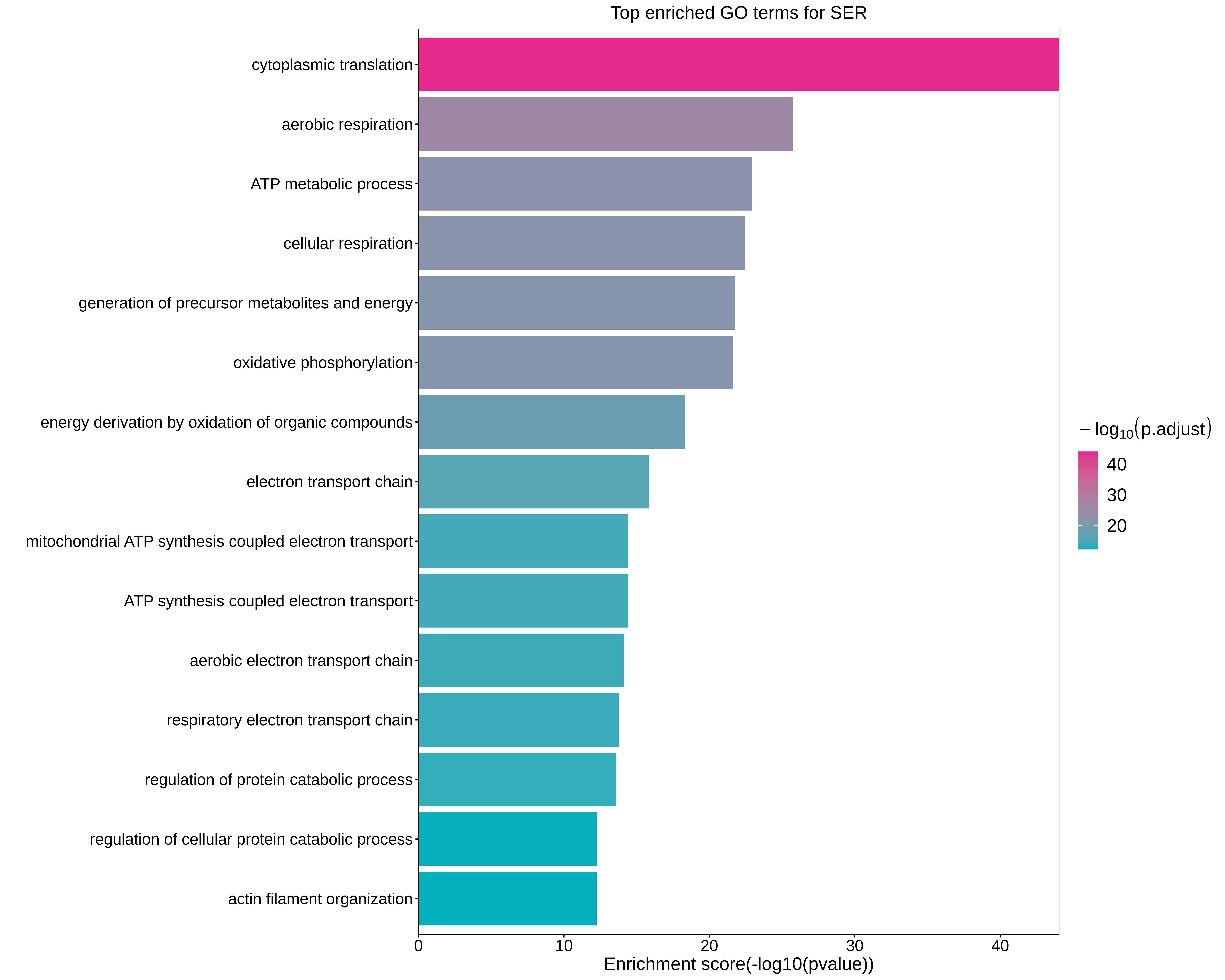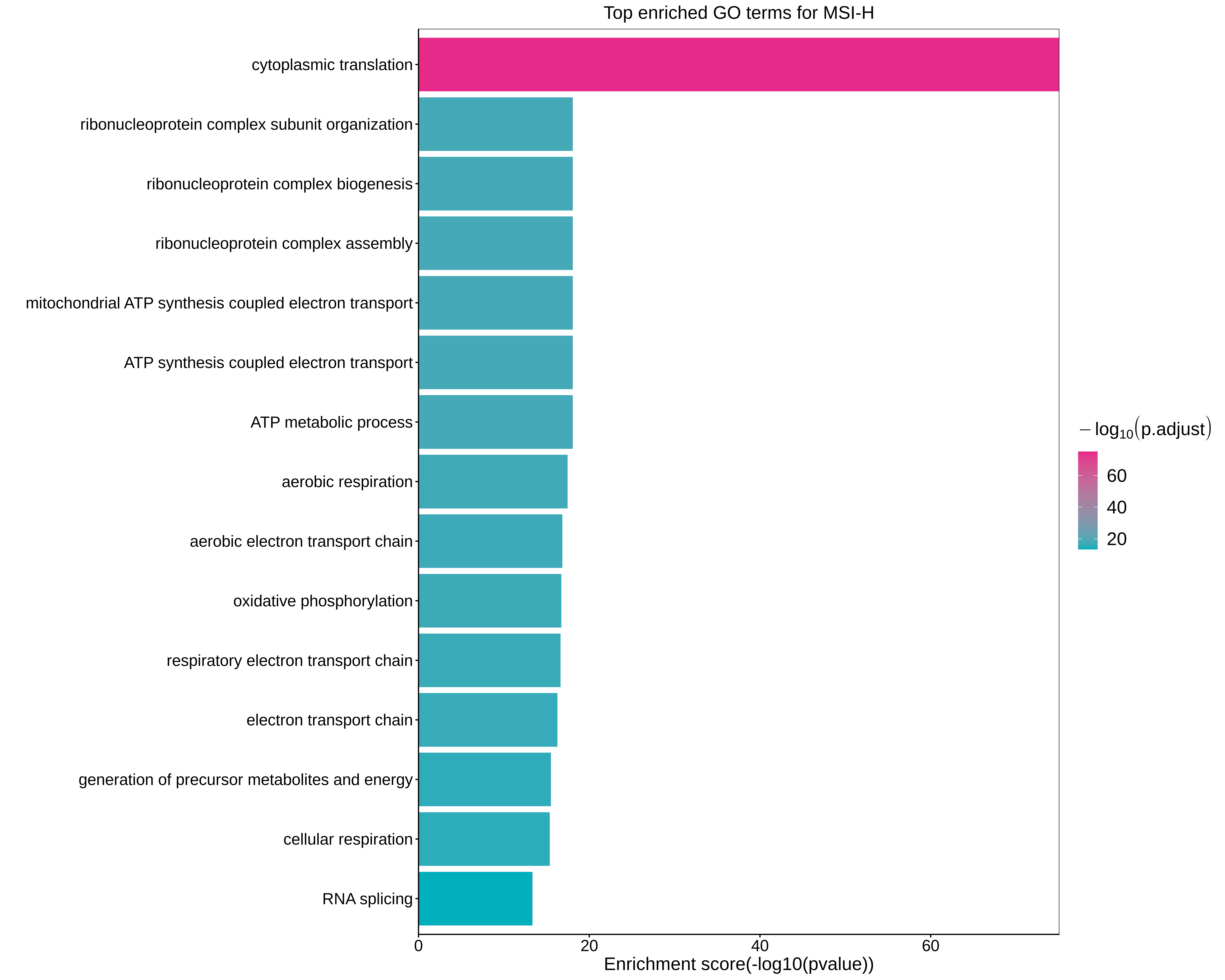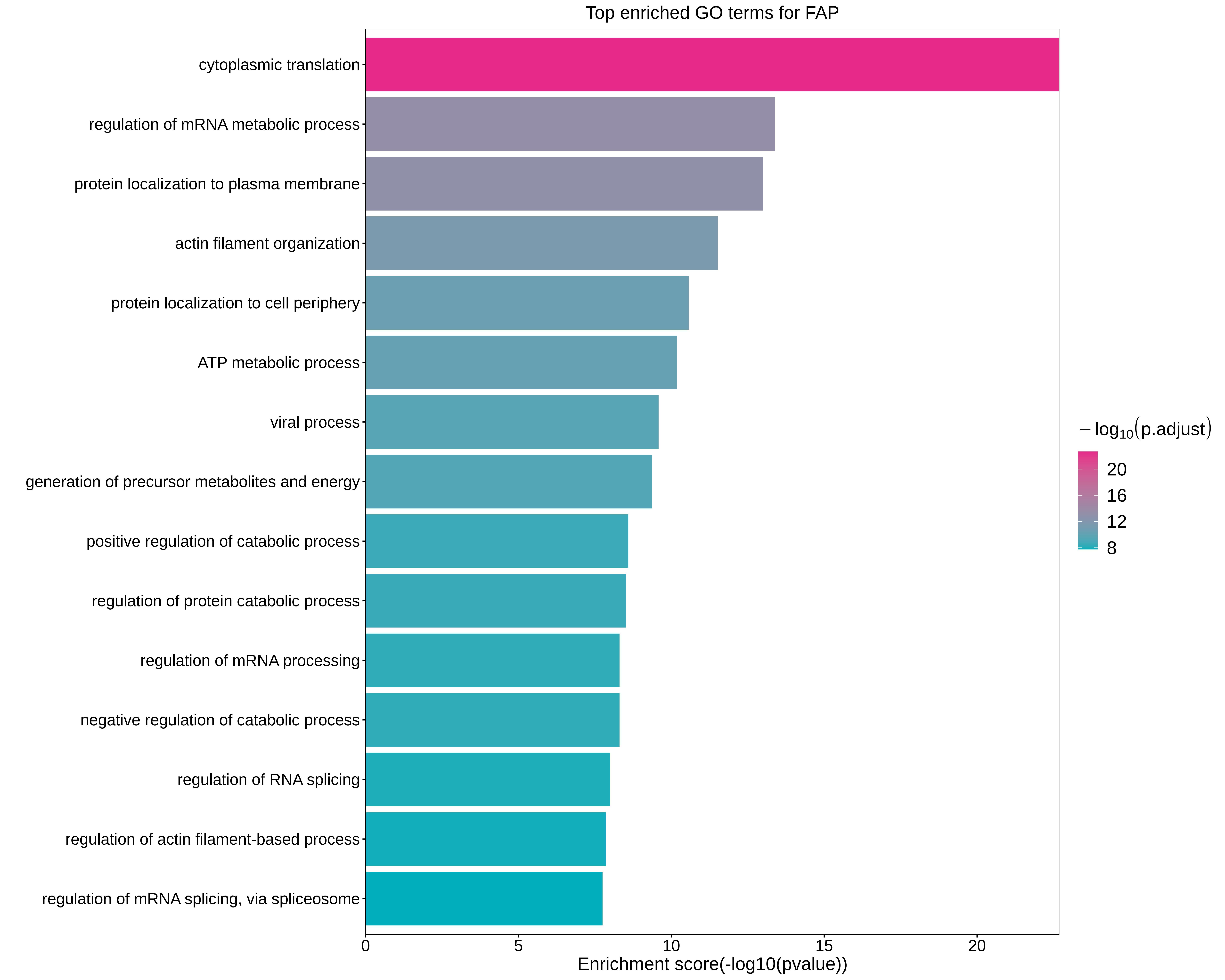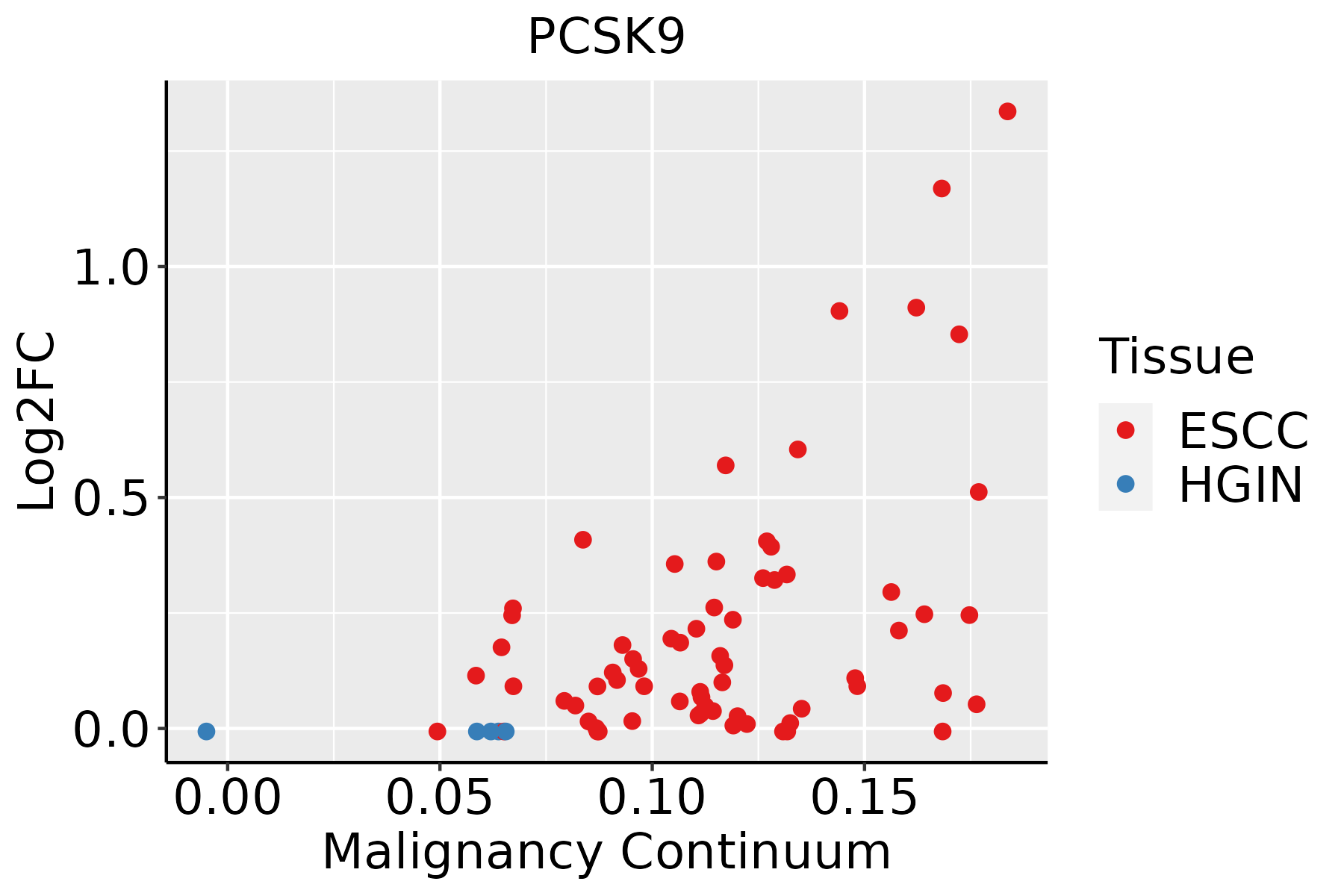
|
|||||
|
 | |
 | |
 | |
 | |
 | |
 | |
 |
Gene: PCSK9 |
Gene summary for PCSK9 |
| Gene information | Species | Human | Gene symbol | PCSK9 | Gene ID | 255738 |
| Gene name | proprotein convertase subtilisin/kexin type 9 | |
| Gene Alias | FH3 | |
| Cytomap | 1p32.3 | |
| Gene Type | protein-coding | GO ID | GO:0001655 | UniProtAcc | Q8NBP7 |
Top |
Malignant transformation analysis |
 Identification of the aberrant gene expression in precancerous and cancerous lesions by comparing the gene expression of stem-like cells in diseased tissues with normal stem cells Identification of the aberrant gene expression in precancerous and cancerous lesions by comparing the gene expression of stem-like cells in diseased tissues with normal stem cells |
| Entrez ID | Symbol | Replicates | Species | Organ | Tissue | Adj P-value | Log2FC | Malignancy |
| 255738 | PCSK9 | LZE2T | Human | Esophagus | ESCC | 4.56e-03 | 4.09e-01 | 0.082 |
| 255738 | PCSK9 | LZE7T | Human | Esophagus | ESCC | 8.65e-03 | 2.60e-01 | 0.0667 |
| 255738 | PCSK9 | P2T-E | Human | Esophagus | ESCC | 5.04e-09 | 2.35e-01 | 0.1177 |
| 255738 | PCSK9 | P4T-E | Human | Esophagus | ESCC | 1.05e-12 | 3.33e-01 | 0.1323 |
| 255738 | PCSK9 | P10T-E | Human | Esophagus | ESCC | 5.55e-24 | 5.70e-01 | 0.116 |
| 255738 | PCSK9 | P12T-E | Human | Esophagus | ESCC | 2.87e-02 | 7.93e-02 | 0.1122 |
| 255738 | PCSK9 | P15T-E | Human | Esophagus | ESCC | 8.92e-04 | 2.62e-01 | 0.1149 |
| 255738 | PCSK9 | P16T-E | Human | Esophagus | ESCC | 8.52e-03 | 9.98e-02 | 0.1153 |
| 255738 | PCSK9 | P21T-E | Human | Esophagus | ESCC | 4.18e-04 | 2.47e-01 | 0.1617 |
| 255738 | PCSK9 | P22T-E | Human | Esophagus | ESCC | 5.84e-13 | 3.26e-01 | 0.1236 |
| 255738 | PCSK9 | P23T-E | Human | Esophagus | ESCC | 5.65e-07 | 3.56e-01 | 0.108 |
| 255738 | PCSK9 | P26T-E | Human | Esophagus | ESCC | 2.73e-14 | 3.93e-01 | 0.1276 |
| 255738 | PCSK9 | P27T-E | Human | Esophagus | ESCC | 6.58e-06 | 1.94e-01 | 0.1055 |
| 255738 | PCSK9 | P28T-E | Human | Esophagus | ESCC | 1.42e-13 | 3.61e-01 | 0.1149 |
| 255738 | PCSK9 | P30T-E | Human | Esophagus | ESCC | 2.89e-15 | 6.04e-01 | 0.137 |
| 255738 | PCSK9 | P31T-E | Human | Esophagus | ESCC | 1.59e-11 | 4.05e-01 | 0.1251 |
| 255738 | PCSK9 | P37T-E | Human | Esophagus | ESCC | 5.49e-26 | 9.04e-01 | 0.1371 |
| 255738 | PCSK9 | P42T-E | Human | Esophagus | ESCC | 1.22e-03 | 1.37e-01 | 0.1175 |
| 255738 | PCSK9 | P47T-E | Human | Esophagus | ESCC | 1.50e-03 | 1.86e-01 | 0.1067 |
| 255738 | PCSK9 | P48T-E | Human | Esophagus | ESCC | 1.29e-03 | 1.50e-01 | 0.0959 |
| Page: 1 2 |
| ∗log2FC in expression of this searched gene in stem-like cells from each diseased tissue sample relative to stem-like cells in normal samples in each tissue plotted against the malignancy continuum. Samples are colored based on if they are from different disease stage. |
Top |
Malignant transformation related pathway analysis |
 Find out the enriched GO biological processes and KEGG pathways involved in transition from healthy to precancer to cancer Find out the enriched GO biological processes and KEGG pathways involved in transition from healthy to precancer to cancer |
| Tissue | Disease Stage | Enriched GO biological Processes |
| Colorectum | AD |  |
| Colorectum | SER |  |
| Colorectum | MSS |  |
| Colorectum | MSI-H |  |
| Colorectum | FAP |  |
| ∗Top 15 enriched GO BP terms are showed in the bar plot of each disease state in each tissue. Each row represents a significant GO biological process which is colored according to the -log10(p.adjust). |
| Page: 1 2 3 4 5 6 7 8 9 |
| GO ID | Tissue | Disease Stage | Description | Gene Ratio | Bg Ratio | pvalue | p.adjust | Count |
| GO:00328015 | Esophagus | ESCC | receptor catabolic process | 23/8552 | 28/18723 | 8.23e-05 | 6.01e-04 | 23 |
| GO:0043525110 | Esophagus | ESCC | positive regulation of neuron apoptotic process | 40/8552 | 58/18723 | 2.83e-04 | 1.71e-03 | 40 |
| GO:00019192 | Esophagus | ESCC | regulation of receptor recycling | 19/8552 | 23/18723 | 3.12e-04 | 1.85e-03 | 19 |
| GO:004352317 | Esophagus | ESCC | regulation of neuron apoptotic process | 122/8552 | 212/18723 | 3.21e-04 | 1.90e-03 | 122 |
| GO:00018813 | Esophagus | ESCC | receptor recycling | 25/8552 | 33/18723 | 4.30e-04 | 2.43e-03 | 25 |
| GO:00464864 | Esophagus | ESCC | glycerolipid metabolic process | 211/8552 | 392/18723 | 6.51e-04 | 3.46e-03 | 211 |
| GO:19026524 | Esophagus | ESCC | secondary alcohol metabolic process | 87/8552 | 147/18723 | 6.58e-04 | 3.50e-03 | 87 |
| GO:004825916 | Esophagus | ESCC | regulation of receptor-mediated endocytosis | 66/8552 | 110/18723 | 1.72e-03 | 7.96e-03 | 66 |
| GO:20006444 | Esophagus | ESCC | regulation of receptor catabolic process | 10/8552 | 11/18723 | 2.54e-03 | 1.08e-02 | 10 |
| GO:00082034 | Esophagus | ESCC | cholesterol metabolic process | 79/8552 | 137/18723 | 3.11e-03 | 1.29e-02 | 79 |
| GO:004826010 | Esophagus | ESCC | positive regulation of receptor-mediated endocytosis | 34/8552 | 52/18723 | 3.26e-03 | 1.35e-02 | 34 |
| GO:00323875 | Esophagus | ESCC | negative regulation of intracellular transport | 37/8552 | 58/18723 | 4.12e-03 | 1.64e-02 | 37 |
| GO:00161254 | Esophagus | ESCC | sterol metabolic process | 86/8552 | 152/18723 | 4.37e-03 | 1.73e-02 | 86 |
| GO:00016559 | Esophagus | ESCC | urogenital system development | 177/8552 | 338/18723 | 7.51e-03 | 2.69e-02 | 177 |
| GO:00323661 | Esophagus | ESCC | intracellular sterol transport | 20/8552 | 29/18723 | 9.66e-03 | 3.34e-02 | 20 |
| GO:00323671 | Esophagus | ESCC | intracellular cholesterol transport | 20/8552 | 29/18723 | 9.66e-03 | 3.34e-02 | 20 |
| GO:000989622 | Liver | HCC | positive regulation of catabolic process | 335/7958 | 492/18723 | 3.83e-31 | 1.87e-28 | 335 |
| GO:003133122 | Liver | HCC | positive regulation of cellular catabolic process | 295/7958 | 427/18723 | 3.20e-29 | 1.45e-26 | 295 |
| GO:004217622 | Liver | HCC | regulation of protein catabolic process | 267/7958 | 391/18723 | 2.45e-25 | 7.38e-23 | 267 |
| GO:003238621 | Liver | HCC | regulation of intracellular transport | 231/7958 | 337/18723 | 1.99e-22 | 3.40e-20 | 231 |
| Page: 1 2 3 4 5 6 7 |
| Pathway ID | Tissue | Disease Stage | Description | Gene Ratio | Bg Ratio | pvalue | p.adjust | qvalue | Count |
| hsa049794 | Liver | HCC | Cholesterol metabolism | 41/4020 | 51/8465 | 1.33e-06 | 1.35e-05 | 7.49e-06 | 41 |
| hsa049795 | Liver | HCC | Cholesterol metabolism | 41/4020 | 51/8465 | 1.33e-06 | 1.35e-05 | 7.49e-06 | 41 |
| Page: 1 |
Top |
Cell-cell communication analysis |
 Identification of potential cell-cell interactions between two cell types and their ligand-receptor pairs for different disease states Identification of potential cell-cell interactions between two cell types and their ligand-receptor pairs for different disease states |
| Ligand | Receptor | LRpair | Pathway | Tissue | Disease Stage |
| Page: 1 |
Top |
Single-cell gene regulatory network inference analysis |
 Find out the significant the regulons (TFs) and the target genes of each regulon across cell types for different disease states Find out the significant the regulons (TFs) and the target genes of each regulon across cell types for different disease states |
| TF | Cell Type | Tissue | Disease Stage | Target Gene | RSS | Regulon Activity |
| ∗The dot plots of a searched regulon are shown for all cell subpopulations in each disease state of each tissue based on the regulon specific score inferred using pySCENIC and by calculating the average expression. |
| Page: 1 |
Top |
Somatic mutation of malignant transformation related genes |
 Annotation of somatic variants for genes involved in malignant transformation Annotation of somatic variants for genes involved in malignant transformation |
| Hugo Symbol | Variant Class | Variant Classification | dbSNP RS | HGVSc | HGVSp | HGVSp Short | SWISSPROT | BIOTYPE | SIFT | PolyPhen | Tumor Sample Barcode | Tissue | Histology | Sex | Age | Stage | Therapy Types | Drugs | Outcome |
| PCSK9 | deletion | Frame_Shift_Del | novel | c.1681+1delG | Q8NBP7 | protein_coding | TCGA-EW-A2FV-01 | Breast | breast invasive carcinoma | Female | <65 | III/IV | Chemotherapy | docetaxel | SD | ||||
| PCSK9 | insertion | Nonsense_Mutation | novel | c.29_30insAG | p.Trp10Ter | p.W10* | Q8NBP7 | protein_coding | TCGA-C5-A2M1-01 | Cervix | cervical & endocervical cancer | Female | <65 | I/II | Unknown | Unknown | SD | ||
| PCSK9 | SNV | Missense_Mutation | rs376385276 | c.290N>A | p.Arg97His | p.R97H | Q8NBP7 | protein_coding | deleterious(0.03) | benign(0.111) | TCGA-5M-AAT6-01 | Colorectum | colon adenocarcinoma | Female | <65 | III/IV | Unknown | Unknown | PD |
| PCSK9 | SNV | Missense_Mutation | c.515A>G | p.Gln172Arg | p.Q172R | Q8NBP7 | protein_coding | tolerated(0.31) | benign(0) | TCGA-AA-3710-01 | Colorectum | colon adenocarcinoma | Female | >=65 | I/II | Unknown | Unknown | SD | |
| PCSK9 | SNV | Missense_Mutation | c.1202N>A | p.Ser401Tyr | p.S401Y | Q8NBP7 | protein_coding | deleterious(0) | possibly_damaging(0.882) | TCGA-AA-3712-01 | Colorectum | colon adenocarcinoma | Male | >=65 | III/IV | Unknown | Unknown | SD | |
| PCSK9 | SNV | Missense_Mutation | rs145468572 | c.1492G>A | p.Glu498Lys | p.E498K | Q8NBP7 | protein_coding | deleterious(0.02) | benign(0.432) | TCGA-AA-3864-01 | Colorectum | colon adenocarcinoma | Male | >=65 | I/II | Unknown | Unknown | SD |
| PCSK9 | SNV | Missense_Mutation | novel | c.1187N>A | p.Ala396Glu | p.A396E | Q8NBP7 | protein_coding | deleterious(0.01) | possibly_damaging(0.834) | TCGA-AA-3872-01 | Colorectum | colon adenocarcinoma | Male | <65 | III/IV | Unknown | Unknown | SD |
| PCSK9 | SNV | Missense_Mutation | rs776367625 | c.1606N>A | p.Val536Ile | p.V536I | Q8NBP7 | protein_coding | tolerated(0.77) | benign(0) | TCGA-AA-A02K-01 | Colorectum | colon adenocarcinoma | Male | <65 | III/IV | Chemotherapy | folinic | PD |
| PCSK9 | SNV | Missense_Mutation | rs865914100 | c.940N>A | p.Ala314Thr | p.A314T | Q8NBP7 | protein_coding | deleterious(0) | probably_damaging(0.989) | TCGA-AY-A54L-01 | Colorectum | colon adenocarcinoma | Female | >=65 | I/II | Unknown | Unknown | PD |
| PCSK9 | SNV | Missense_Mutation | rs777111934 | c.779C>T | p.Thr260Met | p.T260M | Q8NBP7 | protein_coding | deleterious(0) | probably_damaging(0.993) | TCGA-G4-6322-01 | Colorectum | colon adenocarcinoma | Male | >=65 | III/IV | Chemotherapy | oxaliplatin | PD |
| Page: 1 2 3 4 5 |
Top |
Related drugs of malignant transformation related genes |
 Identification of chemicals and drugs interact with genes involved in malignant transfromation Identification of chemicals and drugs interact with genes involved in malignant transfromation |
| (DGIdb 4.0) |
| Entrez ID | Symbol | Category | Interaction Types | Drug Claim Name | Drug Name | PMIDs |
| 255738 | PCSK9 | DRUGGABLE GENOME, ENZYME, CELL SURFACE, PROTEASE | Bococizumab | BOCOCIZUMAB | ||
| 255738 | PCSK9 | DRUGGABLE GENOME, ENZYME, CELL SURFACE, PROTEASE | SPC5001 | |||
| 255738 | PCSK9 | DRUGGABLE GENOME, ENZYME, CELL SURFACE, PROTEASE | inhibitor | 223366063 | BOCOCIZUMAB | |
| 255738 | PCSK9 | DRUGGABLE GENOME, ENZYME, CELL SURFACE, PROTEASE | inhibitor | 178103355 | ALIROCUMAB | |
| 255738 | PCSK9 | DRUGGABLE GENOME, ENZYME, CELL SURFACE, PROTEASE | inhibitor | CHEMBL3137349 | BOCOCIZUMAB | |
| 255738 | PCSK9 | DRUGGABLE GENOME, ENZYME, CELL SURFACE, PROTEASE | REGN-727 | ALIROCUMAB | ||
| 255738 | PCSK9 | DRUGGABLE GENOME, ENZYME, CELL SURFACE, PROTEASE | LY3015014 | FROVOCIMAB | ||
| 255738 | PCSK9 | DRUGGABLE GENOME, ENZYME, CELL SURFACE, PROTEASE | PF-04950615 | BOCOCIZUMAB | ||
| 255738 | PCSK9 | DRUGGABLE GENOME, ENZYME, CELL SURFACE, PROTEASE | inhibitor | 178103915 | EVOLOCUMAB | |
| 255738 | PCSK9 | DRUGGABLE GENOME, ENZYME, CELL SURFACE, PROTEASE | inhibitor | CHEMBL2364655 | EVOLOCUMAB |
| Page: 1 2 |


